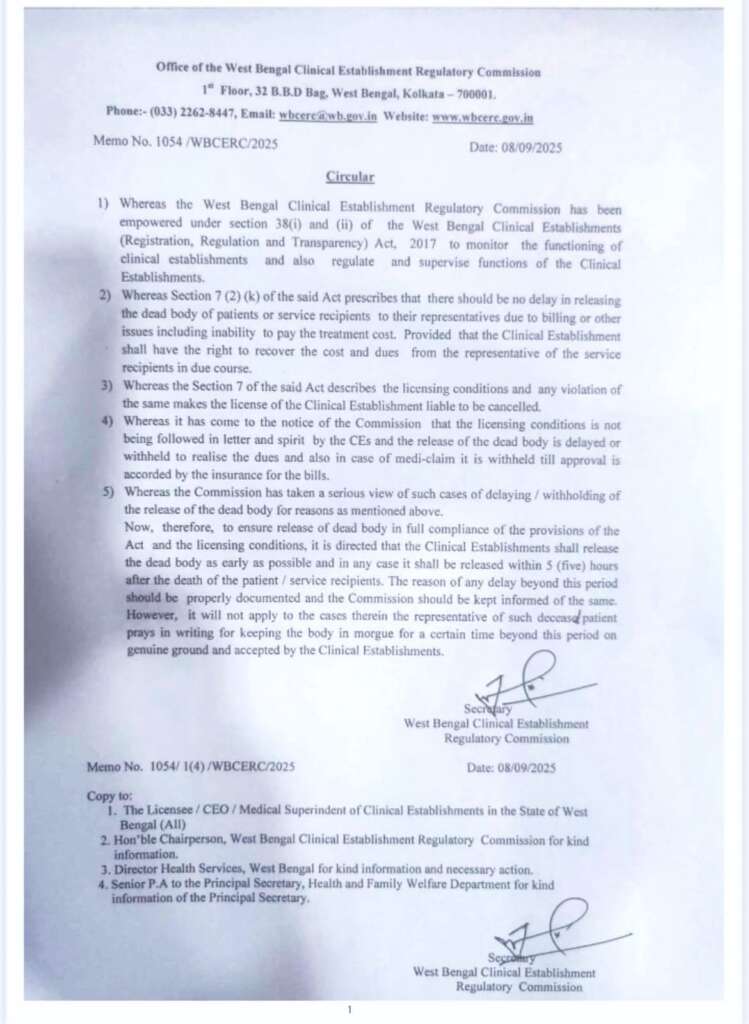The recent circular issued by the West Bengal Clinical Establishment Regulatory Commission (WBCERC) dated 8th September 2025, directing hospitals to release the body of a deceased patient within five hours of death, is not just an administrative order—it is a legal safeguard and a moral reminder.
For far too long, hospitals and nursing homes have indulged in the deeply exploitative practice of withholding dead bodies until families cleared outstanding bills or awaited insurance approvals. In those darkest hours of grief, families were forced to negotiate financially for the right to take their loved one home. As a practicing Advocate, I have encountered cases where relatives stood helplessly outside hospital mortuaries, pleading for release, while officials cited “pending dues.” Such conduct is not only inhumane but also unlawful.
The Law Is Clear
The West Bengal Clinical Establishments (Registration, Regulation and Transparency) Act, 2017 leaves no room for ambiguity.
- Section 7(2)(k) prohibits delay in releasing bodies on account of billing or payment disputes.
- Section 7 further states that violation of licensing conditions—including wrongful detention of bodies—can lead to suspension or cancellation of licenses.
Hospitals have every right to recover legitimate dues. But recovery must be pursued through lawful civil remedies, not through the morally indefensible act of holding a body hostage.

What the Circular Ensures
The WBCERC has now made compliance time-bound:
- Release must occur within five hours of death.
- Delays must be documented and reported to the Commission.
- Families may request, in writing, to keep the body longer for genuine reasons (such as waiting for relatives).
- Failure to comply can invite strict penal action, including cancellation of license.
This is not a mere bureaucratic formality—it is a shield for grieving families against exploitation.
Dignity in Death: A Constitutional Value
The Supreme Court of India has time and again recognized the right to dignity as flowing from Article 21 of the Constitution. This right does not end with death. The dignity of the deceased, and the right of families to perform last rites without harassment, are as sacrosanct as the rights of the living.
By enforcing the five-hour rule, WBCERC has effectively upheld constitutional morality. It has reminded hospitals that medicine is a service bound by compassion, not a trade governed by coercion.
A Larger Message
This directive goes beyond West Bengal. It sets a precedent for other states, where similar complaints have surfaced. If adopted nationally, this rule could redefine the balance between healthcare institutions and patient rights across India.
It also sends a message to corporate healthcare: commercialization cannot override compassion. A hospital is not merely a place of treatment—it is a place where human values must be upheld till the very end.
In the eye of law i mean in our considered view, this order is both timely and necessary.
- It empowers families.
- It disciplines hospitals.
- It restores humanity to a system that often loses sight of it.
While dues and bills are matters of finance, grief is a matter of the heart. Hospitals must learn that the two cannot be bartered.
The WBCERC’s five-hour rule is, therefore, more than regulation—it is a reaffirmation of the principle that bills can wait, but dignity cannot.
